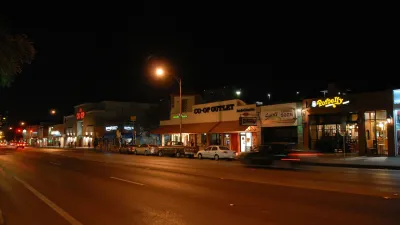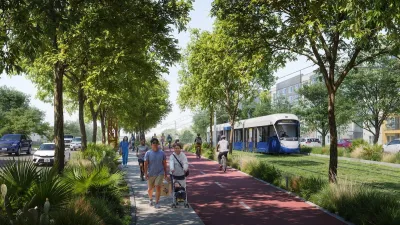The Austin City Council unanimously approved a $1 billion bond measure on August 7, subject to voter approval on Nov. 4 to provide $600 million toward a $1.4 billion, 9.5-mile light rail line and $400 million for freeway improvements.
One of the nation's fastest growing, but traffic-choked cities may once again have the opportunity to vote on a light rail line that would serve Central and Southeast Austin, writes Austin American-Statesman transportation beat reporter Ben Wear.
But the ballot language approved Thursday includes a caveat that the rail borrowing could occur only after a future City Council commits to spending an additional $400 million for road projects on highways of “regional significance,” such as Interstate 35, U.S. 183 and Texas 71.
In other words, light rail is held hostage to freeway spending, such is politics. Nevertheless, getting the council's approval was the rail line's first hurdle, reports KVUE's Ashley Goudeau. The last time light rail was put to a vote was 14 years ago, and it failed, she adds.
Appearing in the KVUE broadcast video is Austin Mayor Lee Leffingwell, a major light rail backer.
Another caveat placed on the light rail spending is that it must receive federal matching funds. If all hurdles are passed, "rail officials here have said the line would open for service about 2022 and have 18,000 boardings a day by 2030," adds Wear.
Wear also writes a comprehensive six-page comparison piece with Portland, Ore. “Almost a quarter of the city’s 300,000-plus workers ride transit, bike or walk to get to their jobs, about triple the percentage in Austin," he writes.
Portland — with 600,000 residents packed into a tightly knit area less than half Austin’s size, priority streets for bicycles and shady, wide sidewalks — has (a dense, easily walkable urban environment to produce high enough ridership to justify the huge cost shared by taxpayers throughout a metro area, referencing Jarrett Walker, a Portland-based transit consultant).
Wear end's his comparison by asking:
The question for Austin voters, in the end, is whether sprawling Austin, Texas, has what light rail requires — or ever will. And if so, can the city, coming so late to the game, afford to play?
[Hat tips to Streetsblog's Katie Pearce for Austin-Statesman piece, to AASHTO's Daily Transportation Update for KVUE's report, and to Sierra Club transportation listerv member David Orr for Ben Wear's Portland comparison piece]
FULL STORY: Austin American-Statesman: Austin City Council puts $1 billion rail, road plan on November ballot

Maui's Vacation Rental Debate Turns Ugly
Verbal attacks, misinformation campaigns and fistfights plague a high-stakes debate to convert thousands of vacation rentals into long-term housing.

Planetizen Federal Action Tracker
A weekly monitor of how Trump’s orders and actions are impacting planners and planning in America.

In Urban Planning, AI Prompting Could be the New Design Thinking
Creativity has long been key to great urban design. What if we see AI as our new creative partner?

Portland Raises Parking Fees to Pay for Street Maintenance
The city is struggling to bridge a massive budget gap at the Bureau of Transportation, which largely depleted its reserves during the Civd-19 pandemic.

Spokane Mayor Introduces Housing Reforms Package
Mayor Lisa Brown’s proposals include deferring or waiving some development fees to encourage more affordable housing development.

Houston Mayor Kills Another Bike Lane
The mayor rejected a proposed bike lane in the Montrose district in keeping with his pledge to maintain car lanes.
Urban Design for Planners 1: Software Tools
This six-course series explores essential urban design concepts using open source software and equips planners with the tools they need to participate fully in the urban design process.
Planning for Universal Design
Learn the tools for implementing Universal Design in planning regulations.
Gallatin County Department of Planning & Community Development
Heyer Gruel & Associates PA
JM Goldson LLC
City of Camden Redevelopment Agency
City of Astoria
Transportation Research & Education Center (TREC) at Portland State University
Jefferson Parish Government
Camden Redevelopment Agency
City of Claremont





























